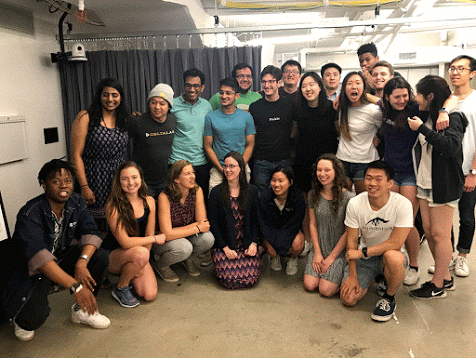
director: Leesha "Aisha" Shah, PhD
LWH 3102
>
welcome :)
>
research areas
>
members
>
apply to join
>
publications
> welcome :)_
At the moliri lab, we explore how technical systems, effective processes, and social structures integrate as socio-technical ecosystems that surface ways to optimally use limited resources in a community. Specifically, we investigate how learning ecosystems can support students as they learn to self-direct complex work in a community with limited mentoring resources.
We ask questions like...
- how might we scale effective undergraduate research training?
- how might we support introductory programming students in their metacognitive reflection and action?
- how might we enable teams to practice effective planning process management when leading design-research projects?
We take a design-based research approach, and work at the intersection of Human-Computer Interaction (HCI), Learning Sciences (LS), and Computer-Supported Cooperative Work (CSCW).
our mission
to design learning ecosystems that enhance and extend the natural ways in which we practice, learn, grow, and support one another in our communities

Our community is pretty spectacular.
> ongoing research_
Continual Support Systems for Agile Research Studio Orchestration
Fall 2017-present
We study the application of continual support systems to support the shared regulation of learning in Agile Research Studios by exploring ways to monitor student progress, recognize when students need additional supports, identify resources within the studio community that could support them, and optimize the routing of those support requests to the resources that have the expertise and ability to help.
Agile Research Studio Model
Spring 2014-present
Agile Research Studios (ARS) is a new socio-technical model for creating a research community of practice that socially shares regulation of learning to apprentice undergraduate teams into research at scale. ARS methodologies, social structures, and tools help groups learn better together so more undergraduates can conduct authentic research.
Continual Support Systems for Engaging Ad-Hoc Crowds
Fall 2014-present
We study the use of a continual support framework, for engaging ad-hoc crowds in supporting others’ needs while still focusing on their primary goals. The continual support framework monitors the status of individual goals and emerging needs; matches individuals to opportune moments to support others’ needs given the state of their goals; and primes individuals with the context they need to provide support on-demand.
> previous projects_
Polaris: Research Planning Scaffolds via Design Argument Critique
Fall 2016-present
To help undergraduates monitor and reflect on their research progress and to make effective use of mentor time, we introduce Polaris, a scaffolding tool that supports novice researchers diagnosing project issues on their own. Polaris guides undergraduate researchers through a reflective exercise using computer-based prompts and templates to create and diagnose issues in design arguments, which detail core hypotheses in design-based research projects.
Students: Bomani McClendon, Sameer Srivastava
Research Outcomes: awarded Undergraduate Research Grant, work submitted to CHI
The STASH: Skill Tracking + Seeking Help
Spring 2016-present
Studying how to support student helpseeking behaviors in ARS, with a goal of distributing support and growing skills across the community.
Students: Aimee van den Berg, Ariella Silver, Shankar Salwan, Sehmon Burnam, Natalie Ghidali
Research Outcomes: awarded 2 Undergraduate Research Grants, work submitted to CHI SRC, CHI LBW
MindYoga: Metacognitive Reflection
Fall 2017-present
Studying how to support student awareness and reflection on their own research and regulation processes, and what prevents them from being effective.
Students: Molly Pribble, Isaac Miller, Neha Sharma, Olivia Gallager, Victoria Cabales, Zev Stravitz, Nneoma Oradiegwu, Maggie Lou, Judy Lee
Research Outcomes: awarded 3 Undergraduate Research Grants, work submitted to CHI SRC, CHI LBW

> publications_
*advised students
MindYoga: Scaffolding the Metacognitive Reflection Process within Learning Ecosystems
*Molly Pribble, *Neha Sharma, Haoqi Zhang, Leesha Maliakal Shah
CHI 2022 Late Breaking Work
The design risks framework: Understanding Metacognition for iteration
Spencer E. Carlson, Daniel G. Rees Lewis, Leesha V. Maliakal, Elizabeth M. Gerber, Matthew W. Easterday
Design Studies 2020
Defining and Assessing Risk Analysis: The Key to Strategic Iteration in Real-World Problem Solving
Spencer E. Carlson, Leesha V. Maliakal, Daniel G. Rees Lewis, Jamie Gorson, Elizabeth M. Gerber, Matthew W. Easterday
ICLS 2018
Planning to Iterate: Supporting Iterative Practices for Real-world Ill- structured Problem-solving
Daniel G. Rees Lewis, Jamie Gorson, Leesha V. Maliakal, Spencer E. Carlson, Elizabeth M. Gerber, Christopher K. Riesbeck, Matthew W. Easterday
ICLS 2018
Agile Research Studios: Orchestrating Communities of Practice to Advance Research Training
Haoqi Zhang, Matthew Easterday, Elizabeth Gerber, Daniel Rees Lewis, Leesha V. Maliakal
CSCW 2017 [poster demo]
[abstract]
CrowdCheer: Situational Crowdsourcing of Motivation for Runners 2nd Place ACM SRC Award
Leesha V. Maliakal
Grace Hopper ACM Student Research Competition 2015
[abstract]
[slides]